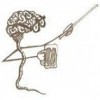Why Freud Pisses Me Off And Can Anyone Answer My Questions?
A while back I was diagnosed with a debilitating mental illness that I inherited genetically from my father and grandmother. I immediately took issue with Freud for two main reasons. One: I blew him off because he did not work with abnormal psychology at all. I considered him to only take on the “easy” cases, Venetian housewives with anxiety about being trapped in the house during the Victorian era. Two: Even if I could cozy up to Freud’s beliefs, I wanted to look into a course of therapy that focused on the way I think now. My childhood was fine, I did not have an onset of my illness until I was fifteen, and according to Doctor Freud (at least from what I understand) things were too late at that point. I know, I know, he’s the Einstein of psychology. What he came up with was groundbreaking. But in my opinion he really messed things up for the field of abnormal psych. Before he came along, mental illness was presumed to come from something that was wrong with the body. It took therapists years to come back to that conclusion. Not only until fairly recently have pills that weren’t anti anxiety come around to treat mental illness. Actually, the first pill designed specifically for mine is less than a decade old! And because Freud only worked with anxious housewives, people still seem to have stigma to this day, telling patients who go to therapy to “get over it,” or to “let a smile be your umbrella.” If it wasn’t for Freud who knows what type of medical treatment I could be receiving now? What really bothers me is that there are modern day Freudians. And that’s why I am writing this, in hopes that someone who adheres to Freudianism or someone who knows something can answer my questions. It terrifies me, TERRIFIES me that people will get a Bachelors degree, get one year of post college Masters education and then start treating patients. I simply believe that therapists should have to have a PHD to be able to treat. Anyway, here are my questions. I’m an open book, and I’m very interested to find out.
1. I know it’s all supposed to be subconscious, but isn’t it shocking at best, perverse at worst, to say that a six month old infant who is teething is going through an “oral sadistic phase?” How do Freudians that treat patients in the year 2010 live with the idea of an Oedipus complex? How is being aware that you at one point wanted to be physical with your parent supposed to help you and not disturb you?
2. How do modern day Freudians deal with his antiquated notions? I can’t seem to find any answers to this one. Penis envy? It just seems like blatant sexism to me. Freud thought that homosexuals weren’t able to resolve their Oedipus/Elektra complexes, but most people this century will concede that gay people were born gay, especially educated people.
3. Latency phase? Hello? Freud seems to just leave out the years 6-12, as if they aren’t important. How could any developmental psychologist just ignore these crucial years?
4. Do Freudians believe in psychopharmaceutical medication and genetic mental illness? If not, should they really be in the mental health industry?
5. Let’s say you go to a Freudian and they figure out that all of your problems are your parents’ fault. What are you supposed to do about it now?
I appreciate anyone’s response.I would maybe post this as a hub. Just a thought. You might get some really good comments and insight into your questions.
My understanding is that Freud developed what became pscho-analysis, which is only one of several psychological approaches (cognitive, behavioral, humanist, bio-chemical... I don't recall them all precisely, it's been a while). Freud was pretty far off on many things, so I would think a true Freudian psychologist, if such a person exists, might be mental health field's equivalent to a Phrenologist.
Indeed. Freud was a product of his time. Modern psychoanalysis comes in a range of forms and traditions that work better for the current situations of modern people.
- ralwusposted 15 years ago
0
Well, then there was that dam Dr Spock who messed up so many children. He did come clean and admit he had been wrong before he passed.
why bother with Freud - or Spock, for that matter. In fact, why follow any "experts"? Do your own research, watch TV, and bake muffins. You will be better off. If you are suffering - be sure to consult your mirror - maybe there is something stuck somewhere. I hope you won't take me seriously! Everyone knows I am an OCD Paranormal with Delusions of Grandeur and a sadistic funny bone. Sorry to disturb you. oops, shouldn't have said that.

If you've been diagnosed with an illness, whether mental or otherwise, you are not the diagnosis, you are a person. Regardless of any psycho-voodoo, you are a person. You are not the illness. The illness is separate from you.
In that regard, Freud and others have little effect, other than to formalize a description of something that can also come with a treatment plan. Some treatment plans are great if the Dr consults with the patient rather than just prescribes. The patient should be proactive about their own treatment and about learning as much as they can, rather than transfer responsibility to a third party who will botch it up nicely.
I've written about this stuff. You really have to be proactive to not be victimized by a very sterile system.
Just my thoughts.When I was growing up I remember hearing Freud was nothing more than a Joke. Can't remember where I heard it though...
(Penis Envy? Probably about as common as Breast Size Jealousy - which is very real but now can be fixed through surgery....)
Probably about as common as Breast Size Jealousy - which is very real but now can be fixed through surgery....)Well the only reason why I brought up my diagnosis was to point out that he has done little to help out in the field of abnormal psych- where people are really suffering. He definitely was a product of his time, but people still believe in what he has to say. So I was wondering if some modern day Freudians could shed some light on my questions.
I am a sociologist so I look at human behavior as a product of the interactions of society impacting upon the individual. The family, economic, education, political and religious institutions molding an individual. So the usual approach to abnormalities are counseling and achieving a happy social environment.
I want to learn more about interdisciplinal approach though like psycho-socialAh, don't let Freud piss you off, there are far more conmen out there
- china manposted 15 years ago
0
Beating up poor old Freud won't help. He was the guy who set out the first bunch of theories about how our minds work - befor ehim they sawed the top of your head off to have a peek, or chained you to the wall and fed you tuesdays and thursdays.
His basic stuff still stands the test of time - only some stuff has been found by countering or disproving his ideas. He remains the base of ALL mental issue thinking either because he has been occasionally proved right and as often wrong - but he started the show that is still running.
Also there is an issue of reading stuff we don't really understand - it is not a simple as it seems sometimes and Freud speaks in generalisations not as direct answers - his basic description of the concious and subconcious mind has stood the test of time.Freud really only worked with rich housewives though- I get what you're saying, but after Freud, lobotomies and insulin treatments were still popular. Can anyone answer my specific questions? Maybe Freud wouldn't annoy me as much if I could understand why people still buy into him today. HOW has his basic stuff still stood the base of time? Is there a Freudian psychologist who can explain to me how they effectively treat patients? I am the first to admit that I am not an expert when it comes to Freud, and I would like to know more.
People 'buy into' psychoanalysis in its modern from. Which does not include most of the issues you raised any more than psychiartry does everything it did a century ago.
FinanceLady,
One of the best comments here, in my opinion, is the most recent one from chinaman...
If you aren't familiar with the feild and with Freud, the tendency is to attack ad hominem (attack the man) concerning a modern state of affairs in psychology.
Yes, Freud made mistakes - yes his theories are subject to questioning because he evaluated and worked with a certain target group of clients...but overall, when people are being trained in psychology fields, they are made quite aware of these things and are further instructed to respect Freud for the historically innovative concepts he supplied to his fields.
I feel you may be worrying much to much about this issue and that because you're speaking of the field of psychology where so much is still unknown, you've assumed that modern day Freudians are largely and potentially dangerous...(also assuming that they will FURTHER Freud's old, erroneous ideas as if they are not aware that many Freudian concepts are proven invalid). To my knowledge, those who appreciate Freud are mainly "researchers" still trying to test out ideas from Freud that are still up in the air, neither fully proven or disproved yet by science/psychology experts today. Also, I think modern Freudians are interested in "Dream-sleep" details - another field where many of Freud's ideas have not yet been proven OR proven to be false yet.
I don't think people are supposed to "buy into Freud" but instead, respect him for the "catalyst" he has been in bridging gaps between superstition and the human mind, between the "waking" and "dreaming" states. Without his proposed explanations, it may have been a long time before "science" realized that the brain doesn't shut "off" when we sleep - that some things we dream are inflected with memories and aren't "fictions," that we people can be helped to overcome past trauma by remembering instead of forgetting (one of the old world view solutions on the matter of trauma was to do everything possible to make a person forget, never talk about, bad past experiences...which Freud HAS PROVEN can be the most damaging, ineffective way to deal with some problems).
That's what I was attempting to communicate, but seem to have failed: nobody buys into him anymore, not literally. If you have found someone that does, they are in a tiny, tiny, tiny minority and completely disengaged from the modern psychological discussion. His contribution is historical, only bits remain in actual practice.
He contributed massively to what became of psychology, just as Ptolemy did to astronomy, but that doesn't mean people still believe in epicycles any more than they believe in what Freud wrote.Here, if these facts help regarding Freud.
Freud came from a pool of psychologists who could be classified collectively as "Gestalt". Consciousness (the "mind" as you know it) was not actually clinically identified and defined until 1963, by the way, so that all psychologists were working in the dark back then). The psychologist who identified human consciousness accurately and traced its evolutions (cir. 1918) was, naturally, sent into exile after his brother was gassed in Ausschwitz, so his work wasn't recovered until Stalin's vaults were opened. Freud believed, like others (Wundt, phenomenologists, Jung) that a person was responsible for the development of his own personality through the decisions he made as he encountered critical challenges (corresponding to "stages" - years during which such critical challenges NORMALLY occur). In other words, he gave very early agency to the human mind, the human will, and the ability to affect our environment, something that humanists have always espoused, as do metaphysical gurus.
He noticed a much-overlooked fact: that an infant deliberately manipulates the presence and comforts of the mother who nurtures him with intense willfulness - in other words, he doesn't just lie there like a lump waiting to be fed, he's fully and utterly engaged and begins to learn his place, his relations, and his agency in the world just as soon as he open his eyes, grasp, and vocalize. He began to look at what happens as infants grow into children and encounter critical challenges - walking, bowel control, gender identity, realizing that the parent is not an object to be manipulated, but rather, an object of desire that the child normally cannot dominate for the satisfaction of his own needs (Freud's definition of "sadistic").
The clientele he ended up with, as all working therapists, was not all of his choosing. Husbands may have employed him to treat hysteria in their wives, sure, but his main clientele were seriously troubled and self-destructive neurotics who were sexually abused and sexually abusive and showing signs of having developed Jekyl and Hyde type personalities. Because of the great uproar over his assertion that children are sexual in infancy, he was not well-funded nor ever really well-received. That he stands as the basis for any psychotherapy today is a phallacy. He never DID serve as a basis. His theories just don't pan out - close, but no dice. His operative principles, however, are sound - that development is a dynamic on-going process and that individuals play an equal part in their development, but if they screw it up, they deny their agency and subsequently hinder their own autonomy.
Another important aspect of his research was his use of story and history in discourse with his patients. He co-authored a history with his clients as they attempted to rewrite their past, using imagination to learn and correct mistakes and get to the truth of their abuse, etc. He identified denial correctly and described the neurotic denial mechanisms with unerring accuracy (but tell that to a neurotic in denial, and see what you get). He followed, loosely, Jungian archtypes, and he followed closely the Gestalt approach of perceiving the patient in context; i.e., he saw the patient's behaviors and beliefs as relevent to the patient's own neurotic context, and rather than challenge the context, he reinforced it to gain patient-therapist transference (trust), and waited it out as the patient slowly began to address the cause of his behaviors, and properly resolve confrontations and challenges left trapped in childhood failures. Freud always believed that a patient could heal himself, rewrite his future, take agency in his own recovery process through empowerment, through the therapist's acceptance and impartiality. All those foundational approaches were overshadowed by his misogynistic, gender-biased perceptions, which every gentleman of the day shared, especially "the educated ones", a perception as inaccurate as your claim that "educated people" believe that gays are born gay.
No one is going to use Freud to help you resolve your mental illness that is genetic, so you have nothing at all to fear. Unless you are suffering from sexual repression, sexual abuse, or abandonment, Freud will be of no use to you or your therapist whatsoever. But to say that you are terrified that someone may get a Bachelor's degree majoring in Freudian psycho-sexual developmental theory is shared by many people today. He's credited with groundbreaking work, but, he basically worked with neurotics, not "normal" people, and his lens was screwed on too tight, due to the conventions of his times.
I didn't mean to sound stuffy or aggressive in that last post. My concern is that you, FinanceLady, are working yourself up over "Myths about Freud" and - check out my name lol - I have made a deliberate study of "Things Freudian" before, even for University professors, for papers...and I was "enthusiastic" when I wrote the last post but may have appeared bossy or stuffy...
I LIKE Freud - a lot...and find his ideas interesting with no end. THAT is the interest and respect that most people can give concerning Freud - but most people have to agree NOT TO pursue many of Freud's methods, as many are proven to be invalid, ineffective and off the mark.You didn't sound stuffy or aggressive, and hey, this is over the internet. You're not really hurting any feelings here. A few of you have disagreed with me, and yet disagreed with yourselves.
One person said that people buy into psychoanalysis in it's current form. you gave them the thumbs up I think. Shadesbreath says that practically no one buys into him anymore, and you say that most people have to agree not to pursue many of Freud's methods. So that's three different answers.
Yet I can site specific books that speak about modern day Freudians. One is right in front of me actually. It's called "An Introduction to Theories of Human Development." It was published in 2004. I'll give you a quote from the book word for word. "Freudian theory has traditionally viewed the final election of homosexuality as a form of deviance.....However,, in recent treatments of homosexuality, some modern day Freudians have taken a more complex view."
So you can see that from I've read, not only are there modern day Freudians, but they are still talking about the issues i brought up. I would disagree with anyone who says that no one buys into Freud, but it appears that you do (or do you? I'm not sure with all of these different replies) too.
Sigmund Freud was one of the first to project the fact that not all mental conditions were caused by demons or abnormalities in the body and brain, and for that, he has been immortalized. However, Freud never quite made the connection that some mental illnesses are genetic, some are acquired as one ages, and some are produced by external events.
For Freud, it was more a world of seeking a deep-rooted cause than it was providing a longterm effect, which is where the medical community is headed today.
Just as not all people are born with ten fingers and toes, some aren't born with the right chemical balance in their brain. This often manifests itself as schizophrenia and other types of psychosis. However, an event such as a traumatic blow to the head can produce the same response, so mental illness can be developed over time, just as it can be delivered at birth.
Where things get complicated is when PTSD is involved. In these instances, mental illness is a learned condition, rather than a perceived defect that worsens over time. And it's this area of research that Freud championed ... without ever knowing it. For Freud, the notion that someone was *made* to suffer from a mental illness rather than being born with it proved extremely revolutionary in his time. However, he spent his lifetime applying this philosophy to many people which it didn't fit, and found many causes that just didn't make sense.
The fact that a child will take to a bottle just as it would a breast tells us that children feed because they hunger, and yet, Freud saw this bond as something more. Yes, for the mother it was, for it established a protective bond with her child, but to say this bond could somehow disturb the child was pure rubbish.
And where is this field headed in the future? Pharmacology ...
New drugs are being created daily that target mental illness and actually attempt to remove it from the brain. Just recently, I wrote an article on my site about a drug called Ecstasy (yes, the party drug) showing a lot of promise as a cure for PTSD. In fact, in trials it cured a high percentage patients.
So, why aren't doctors prescribing Ecstasy for PTSD? Well, for one thing, it's still a very dangerous drug. For another, there is the fear among the medical community of people self-prescribing to mend their ills. People in a private study are watched over constantly, whereas self-medicators stand on a soft precipice, precariously near a great fall.
Whether mental illness is a born or learned behavior, the cure always goes back to mending the brain to allow the patient to live a normal life, and back in Freud's day that wasn't even a concept. Back then, it was about exorcising demons from the body, Bur Freud changed all of that by promoting therapy as a cure. However, those who have been through therapy know that it isn't a cure, so much as it is developing coping skills to help yourself step around problems.
For instance, the man who fears strangers is able to walk into a crowded store because he keeps telling himself he's the only one there. He's learned to cope through therapy, but he isn't really cured of the situation, as the truth of his situation still exists within his stomach as he passes through the door. But still, being able to normalize your life through a different means of thinking has great merit, and that's where Freudian thinking has led us today.
What's the solution of tomorrow? For PTSD sufferers, it will probably be some method by which bad memories are removed from the brain, alleviating the need for avoiding a past event that still haunts us - like 911.
As for those genetically or medically prepossessed with mental illness, the cure would seem to be a tune-up of the brain that would get the chemicals flowing properly and each area performing at its normal capacity.
But here's the interesting clincher ... Not all mental illnesses stem from the brain. In fact, a research project with mice found that some mental illnesses arise from the marrow in our own bones - like an immunological reaction. In fact, research was performed, whereas mice were cured of, or given, a particular disorder, all by transplanting the marrow in their bones. Given this to be true, we can see how mental illness can be a symptomatic virus that spreads throughout the body, making the treatment of such all that more interesting - and difficult.
As for answering your biggest question ... Freudian psychology remains around today because our best medical interventions to date are still highly primitive. As such, we find ourselves reconditioning the patient's thinking, with the hope it will allow them to live normal and productive lives. And until we learn more, this is the only solvent solution we have that shows some mediocre success in many patients.
Of course, once we learn how mental illnesses actually work, we will lock Freud away in a closet and get to healing people, rather than retraining them to think differently. And that will be a beautiful day for the many who suffer ...
And should I write a hub about this? If I were to do so, it would be to announce breakthroughs in treatment, rather than establish why these conditions still exist. People who suffer from mental illnesses and PTSD need hope, not lengthy explanations of their condition. As such, I'm willing to tribble over this in a forum, but if I am to write an article I want it to offer ... hope.
Related Discussions
- 49
What if transgenderism is really mental illness?
by LoliHey 8 years ago
What if transgenderism is really mental illness?Is there any chance it is? Should those with gender issues seek professional help? Why would we embrace it, rather than help the person overcome it?
- 42
Is Selflessness a Sign of Mental Illness?
by Grace Marguerite Williams 4 years ago
Why is selflessness touted as a virtue when in fact, selflessness is considered to be an aberration? Healthy people are selfish. Being selfish is essential to mental well-being. People who are selfless are oftentimes taken advantage of by others who view them as easy marks,...
- 18
Why do some families of the mentally ill turn their backs on them?
by Theresa Collins 8 years ago
Why do some families of the mentally ill turn their backs on them?I have seen many people who are truly, seriously, mentally ill with diagnosis such as Schizophrenia have no one, absolutely no one. Their families have disownded them. Although it is extremely difficult to deal with someone with that...
- 9
Do you think mental illness can be overcome or is it just your lot in life if ev
by aka amanda 13 years ago
Do you think mental illness can be overcome or is it just your lot in life if ever diagnosed?
- 14
Are you afraid of people with a Mental Illness?
by Jenny Anne 13 years ago
Are you afraid of people with a Mental Illness?
- 929
Does it embarrass you to suffer from a mental illness?
by Karli Christine Duran 15 years ago
I'm 32, and I have suffered with mental illness all my life. Sometimes with certain people I don't mind talking about my certain disorders, but other times, I feel ashamed and embarrassed. I guess it depends on the people you are talking to and the mental illness you are disclosing to...



















